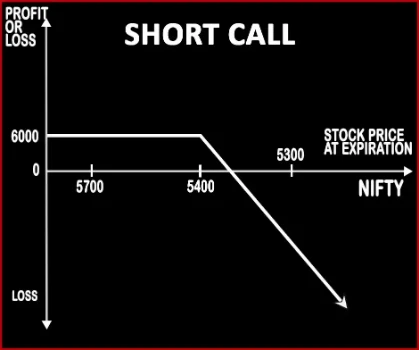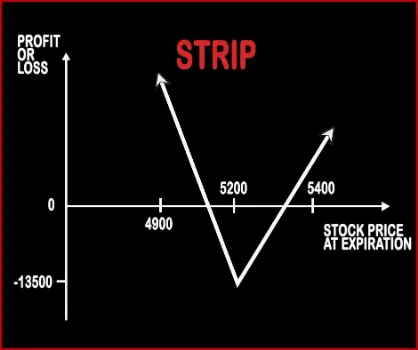Compare Strategies
| SHORT CALL | STRIP | |
|---|---|---|

|

|
|
| About Strategy |
Short Call Option StrategyA trader shorts or writes a Call Option when he feels that underlying stock price is likely to go down. Selling Call Option is a strategy preferred for experienced traders. However this strategy is very risky in nature. If the stock rallies on the upside, your risk becomes potentially unquantifiable and unlimited. If the strategy |
Strip Option StrategyStrip Strategy is the opposite of Strap Strategy. When a trader is bearish on the market and bullish on volatility then he will implement this strategy by buying two ATM Put Options & one ATM Call Option, of the same strike price, expiry date & underlying asset. If the prices move downwards then this strategy will make more profits compared to short straddle because of the .. |
SHORT CALL Vs STRIP - Details
| SHORT CALL | STRIP | |
|---|---|---|
| Market View | Bearish | Neutral |
| Type (CE/PE) | CE (Call Option) | CE (Call Option) + PE (Put Option) |
| Number Of Positions | 1 | 3 |
| Strategy Level | Advance | Beginners |
| Reward Profile | Limited | Unlimited |
| Risk Profile | Unlimited | Limited |
| Breakeven Point | Strike Price of Short Call + Premium Received | Upper Breakeven Point = Strike Price of Calls/Puts + Net Premium Paid, Lower Breakeven Point = Strike Price of Calls/Puts - (Net Premium Paid/2) |
SHORT CALL Vs STRIP - When & How to use ?
| SHORT CALL | STRIP | |
|---|---|---|
| Market View | Bearish | Neutral |
| When to use? | It is an aggressive strategy and involves huge risks. It should be used only in case where trader is certain about the bearish market view on the underlying. | When a trader is bearish on the market and bullish on volatility then he will implement this strategy. |
| Action | Sell or Write Call Option | Buy 1 ATM Call, Buy 2 ATM Puts |
| Breakeven Point | Strike Price of Short Call + Premium Received | Upper Breakeven Point = Strike Price of Calls/Puts + Net Premium Paid, Lower Breakeven Point = Strike Price of Calls/Puts - (Net Premium Paid/2) |
SHORT CALL Vs STRIP - Risk & Reward
| SHORT CALL | STRIP | |
|---|---|---|
| Maximum Profit Scenario | Max Profit = Premium Received | Price of Underlying - Strike Price of Calls - Net Premium Paid OR 2 x (Strike Price of Puts - Price of Underlying) - Net Premium Paid |
| Maximum Loss Scenario | Loss Occurs When Price of Underlying > Strike Price of Short Call + Premium Received | Net Premium Paid + Commissions Paid |
| Risk | Unlimited | Limited |
| Reward | Limited | Unlimited |
SHORT CALL Vs STRIP - Strategy Pros & Cons
| SHORT CALL | STRIP | |
|---|---|---|
| Similar Strategies | Covered Put, Covered Calls | Strap, Short Put Ladder |
| Disadvantage | • Unlimited risk to the upside underlying stocks. • Potential loss more than the premium collected. | Expensive., The share price must change significantly to generate profit., High Bid/Offer spread can have a negative influence on the position. |
| Advantages | • With the help of this strategy, traders can book profit from falling prices in the underlying asset. • Less investment, more profit. • Traders can book profit when underlying stock price fall, move sideways or rise by a small amount. | Profit is generated when the share price changes in any direction., Limited loss., The profit is potentially unlimited when share prices are moving. |